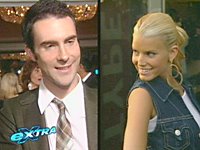The New York Times offered up this headline today:
Puzzles: Think Global!It immediately called to mind Apple's "Think Different" campaign, which was roundly criticized for being ungrammatical. Technically, it is.
That said, SPOGG will issue Apple a get-out-of-trouble pass, while The New York Times copyeditor will get off with a warning for unfelicitous cribbing.
Why? Because there is a slight difference in meaning between "think globally" and "think global," and "think differently" and its ridiculously trademarked-by-Apple equivalent.
"Think different" and "think global" aren't telling readers how to think; they're telling readers to think about what it means to be different and globally concerned.
The authors of those sentences had a reason for bending the rules of the language; they weren't just breaking them out of ignorance, as is altogether too common with marketing.
They could have used more words to make this more clear, but their constructions almost certainly wouldn't have been as infectious or memorable, in the same way "Got milk" lingers in the memory more than, "Do you have any milk?"
Even this milk line is just an updated of the classic, "Would you have any Grey Poupon," which for years was the marketing slogan for our second-favorite kind of mustard.
Here, the writers had to be perfectly and stuffily grammatical because their commercial involved a butler, two limousines and an undoubtedly illegal roadside mustard transfer. The language fit the high-class brand they were working to establish.
This is part of what good writing does: It evokes ideas and emotion in the reader. The words, artfully and memorably combined, carry more weight than they could alone. As long as the feelings being summoned are those the author intended, then language and its craftsmen are doing the job. In fact, they're working alchemy-like magic.
When it comes to meaning vs. rules, the meaning must be the higher master. Otherwise, we lose the magic -- an idea that offends the good people of SPOGG.
When the writing is memorable enough that others -- even New York Times headline writers -- are ripping it off, then it has to be good.
And we write this with full apologies to whoever wrote, "With a name like Smuckers, it has to be good."*
* Technically, this should be "such as Smuckers." But we think that rule stinks, too, because it encourages clunky prose.












 P.S.: The show is now moving to Tuesdays. Don't miss it. Really!
P.S.: The show is now moving to Tuesdays. Don't miss it. Really!